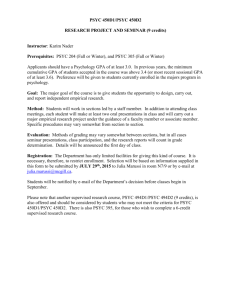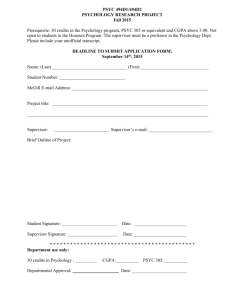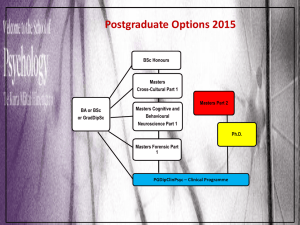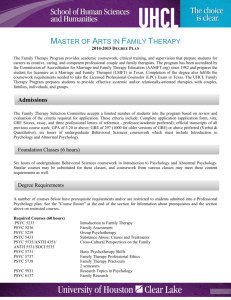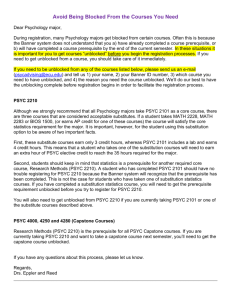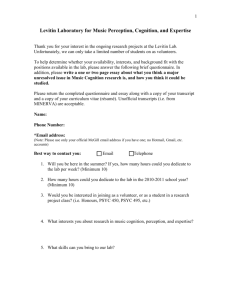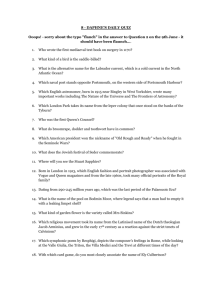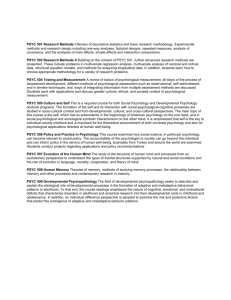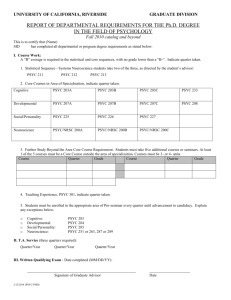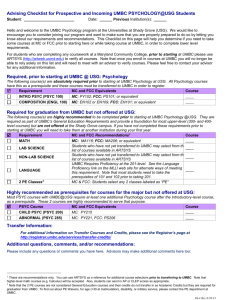Psychology Major Map - Career Services
advertisement
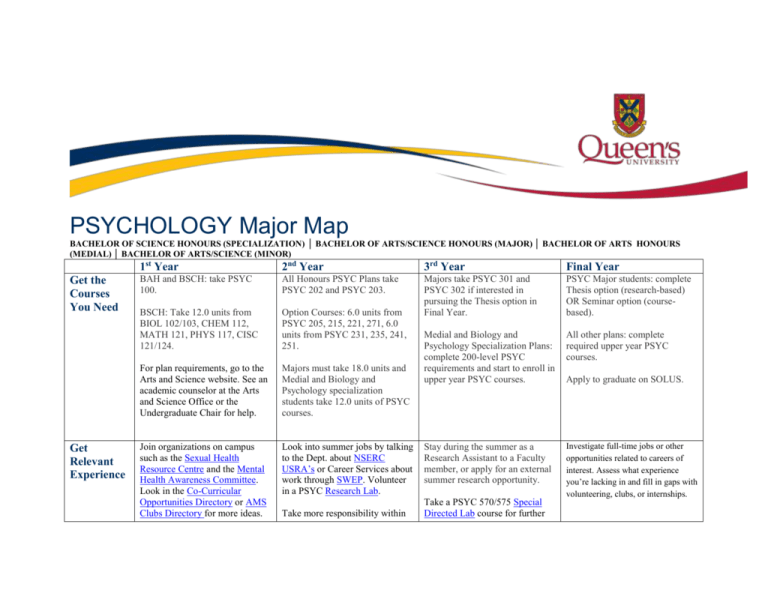
PSYCHOLOGY Major Map BACHELOR OF SCIENCE HONOURS (SPECIALIZATION) │ BACHELOR OF ARTS/SCIENCE HONOURS (MAJOR) │ BACHELOR OF ARTS HONOURS (MEDIAL) │ BACHELOR OF ARTS/SCIENCE (MINOR) Get the Courses You Need Get Relevant Experience 1st Year 2nd Year 3rd Year Final Year BAH and BSCH: take PSYC 100. All Honours PSYC Plans take PSYC 202 and PSYC 203. BSCH: Take 12.0 units from BIOL 102/103, CHEM 112, MATH 121, PHYS 117, CISC 121/124. Option Courses: 6.0 units from PSYC 205, 215, 221, 271, 6.0 units from PSYC 231, 235, 241, 251. Majors take PSYC 301 and PSYC 302 if interested in pursuing the Thesis option in Final Year. PSYC Major students: complete Thesis option (research-based) OR Seminar option (coursebased). All other plans: complete required upper year PSYC courses. For plan requirements, go to the Arts and Science website. See an academic counselor at the Arts and Science Office or the Undergraduate Chair for help. Majors must take 18.0 units and Medial and Biology and Psychology specialization students take 12.0 units of PSYC courses. Medial and Biology and Psychology Specialization Plans: complete 200-level PSYC requirements and start to enroll in upper year PSYC courses. Join organizations on campus such as the Sexual Health Resource Centre and the Mental Health Awareness Committee. Look in the Co-Curricular Opportunities Directory or AMS Clubs Directory for more ideas. Look into summer jobs by talking to the Dept. about NSERC USRA’s or Career Services about work through SWEP. Volunteer in a PSYC Research Lab. Stay during the summer as a Research Assistant to a Faculty member, or apply for an external summer research opportunity. Investigate full-time jobs or other opportunities related to careers of interest. Assess what experience you’re lacking in and fill in gaps with volunteering, clubs, or internships. Take more responsibility within Take a PSYC 570/575 Special Directed Lab course for further Apply to graduate on SOLUS. 1st Year Get an upper year Peer Mentor in PSYC. Ask the PSYC DSC for details. Get Connected with Your Community Get Thinking Globally Get Ready for Life After Graduation Volunteer on or off campus with different community organizations such as Autism Ontario Kingston, Big Brothers Big Sisters KFL&A, Telephone Aid Line Kingston, and the Kingston Sexual Assault Centre. Queen’s University International Centre is your first stop to internationalizing your degree. Speak to a QUIC advisor or get involved in their many programs, events and training opportunities. Grappling with program decisions? – go to different Program Information Sessions by the Departments or various Career Fairs in the year. Get some help deciding by visiting Career Services. 2nd Year 3rd Year Final Year different clubs or extracurriculars. Attend workshops and training sessions offered to students through the CMHA. Get involved with the Departmental Student Council (DSC). Think about applying to volunteer at the Peer Support Centre, HCDS, or other services. research experience. Apply to be a PSYC 100 TA through PSYC 400. Present PSYC 501 Thesis Poster at the Ontario Undergraduate Thesis Conference. Do targeted networking with people working in careers of interest (with alumni, using LinkedIn, etc.). Connect with professors at events or workshops hosted by the DSC. Meet one on one with professors or graduate students. Consider joining professional associations, such as the Ontario Psychological Association and the Canadian Counselling and Psychotherapy Association. Get involved with other cultures or improve your language skills. Stop by QUIC for ideas to go abroad, volunteer at QUIC or attend one of their events. Prepare yourself to work in a multi-cultural environment by taking QUIC’s Intercultural Competency Certificate, and start thinking about work or further studies abroad. Start or continue volunteering with organizations such as Hotel Dieu Hospital and the Elizabeth Fry Society Kingston. Is an exchange in your future? Start thinking about where you would like to study abroad. Apply in January for a 3rd year exchange through the International Programs Office. Attend the Bader International Study Centre in the U.K. for their spring/summer session. Explore careers of interest by reading books in the Career Services Information Area, such as Career Paths in Psychology, or by finding and connecting with alumni on LinkedIn. Go to the PSYC Careers Night in February, hosted by the PSYC DSC. Pursue Summer Internship/Work opportunities with CIDA. Take a French Conversation class through the Francophone Centre Start focusing on areas of interest. Learn about the requirements for careers of interest– do they need additional schooling? If so, prepare to take the required tests (like the GRE, LSAT or GMAT). Attend Grad School workshops at Career Services if interested. Present papers, projects, and/or research at Inquiry @Queen’s. Volunteer with Immigrant Services Kingston & Area. Apply to jobs or future education, or make plans for other adventures. Prepare your application and reference letters if you’re applying to graduate school. Take CV/resume building and interview skills workshops. Caution: *This map is meant as a guide to provide suggestions throughout your university career. The activities, resources, and careers mentioned are possibilities – you are not restricted to them and you don’t have to follow this exact timeline. Every person (including you!) will find their own unique path through their degree at Queen’s and beyond. Page | 2 © Career Services, Queen’s University, 2014-2015 Where could I go after graduation? Advertising Basic and applied research Broadcasting - radio and TV Business administration and management Child and youth care Community development Conflict resolution and mediation Consumer behavior Corrections Counseling Career counseling Demography Ergonomics Forensic assessment Fundraising and events management Health care administration Human resources Image consulting Law Marketing Media – electronic & print Page | 3 © Career Services, Queen’s University, 2014-2015 Medicine Mental health services Neuroscience Occupational Health and Safety Occupational therapy Physical therapy Professor Program evaluation Psychiatry Social work Speech and language pathology Teaching *some careers may require additional training Page | 4 © Career Services, Queen’s University, 2014-2015 Psychology at Queen’s Why study Psychology? Psychology can be divided broadly into two branches: natural science and social science. In the natural science branch of Queen’s Psychology program, you will learn about basic processes of cognition and behavioural neuroscience, including the effects of brain damage or drug-induced changes on behaviour, how various neurochemicals affect normal and abnormal behaviour, mechanisms of memory, motor control, and how we solve problems. The social science branch of the program focuses on child development, personality differences, how people act in groups or organizations, health-related behaviours, and various aspects of normal and abnormal behaviour. Our Arts and Science students study both areas and are free to focus further upon the area that interests them the most. Courses in statistics and design are central to all of our programs. What program options are there? Getting what you need to succeed in the workplace What do employers want? In a recent survey from the Canadian Council of Chief Executives the top 6 skills sought by employers were: 1 People skills 2 Communication skills 3 Problem-solving skills 4 Analytical abilities 5 Leadership skills 6 Industry-specific Knowledge How do I get the skills I need? It is important to develop a balanced skill set – many of which you will develop during your studies. To stand out from the crowd, gain experience outside the classroom through the multitude of clubs and activities in and around Queen’s. Check out ideas in the Get Relevant Experience section of this map. Page | 5 © Career Services, Queen’s University, 2014-2015 What can I learn studying Psychology at Queen’s? Knowledge of areas of psychology such as perception, cognition, motivation and childhood development Research – conduct statistical research, understand scientific journal articles, clearly interpret and articulate research data Knowledge of human and animal behaviour and development Knowledge of psychological research techniques and statistical methods Oral and written communication – prepare and present reports from research Observation and decision-making Resource and time management Insight to deal effectively with people, show concern for and sensitivity to others Critical and inferential thinking – analyze and interpret information What makes ME special? You have a unique set of skills and experiences. Take the time to think about the skills you have personally developed at Queen’s. Explaining your strengths with compelling examples will be important for applications to employers and further education. For help, check out the Career Services skills workshop. Page | 6 © Career Services, Queen’s University, 2014-2015 Psychology Major Map How to use this map • Got questions about careers and classes? • Feeling a little lost or overwhelmed by choices? • Wondering what you are “supposed” to be doing? Use this map to plan for success in five overlapping areas of career and academic life. Each map helps you explore possibilities, set goals and track accomplishments. To make your own custom map, use the My Major Map tool. Don’t stress if you haven’t done all of the suggested activities. The map is not a prescription – it’s a tool for finding your own way at Queen’s. Page | 7 © Career Services, Queen’s University, 2014-2015 Support for Student Success Aspect of Student Health Personal and Physical Health Socio-Cultural and Spiritual Health Career and Professional Health Academic and Intellectual Health Emotional and Mental Health Social and Interpersonal Health Resources Athletics and Recreation Health Counselling and Disability Services Aboriginal Student Centre International Centre Chaplain Outreach Counsellor Cross-Cultural Counsellor Town-Gown Career Services AMS International Centre Student Academic Success Services: Learning Strategies and the Writing Centre Academic Advising Adaptive Technologies Learning Commons Health Counselling and Disability Services Peer Support Centre AMS Rector Residence Life Student Experience Office Queen’s Legal Aid See queensu.ca/studentaffairs for details Page | 8 © Career Services, Queen’s University, 2014-2015 Department of X Faculty of X ADDRESS XX STREET PHONE NUMBER EMAIL Page | 9 © Career Services, Queen’s University, 2014-2015
